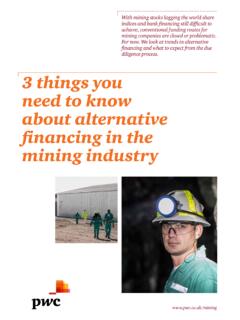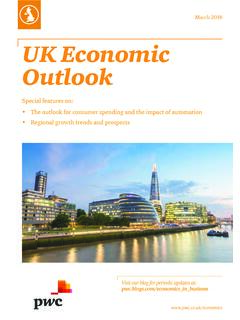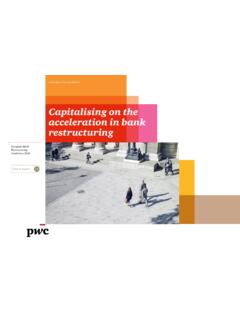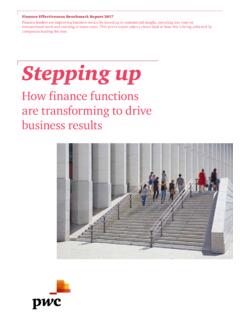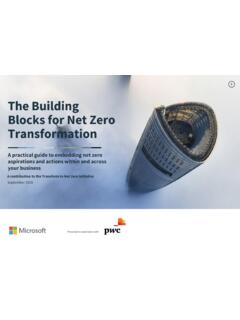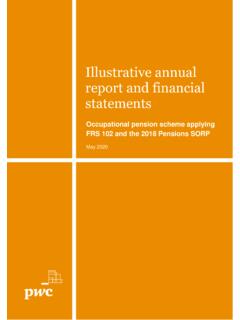Transcription of Continuing obligations for companies listed in the UK ...
1 January obligations for companies listed in the UKContentsPageIntroduction 2 Continuing obligations framework3 Overview of the key requirements of the Continuing obligations regimeThe Listing and Premium Listing Principles5 Listing Rules6 Disclosure Guidance and Transparency Rules9UK Corporate Governance Code11 FCA Corporate Governance Rules13 Auditors review of corporate governance disclosures15 Market Abuse Regulation16 Other requirements17 Further information18 AppendicesAppendix 120 Appendix 2211 | Continuing obligations for companies listed in the UK | PwCIntroductionA company listed in the UK is subject to the Continuing obligations imposed by the Financial Conduct Authority ( FCA ) and the London Stock Exchange. The key Continuing obligations imposed by the FCA can be found in the Listing Rules and the Disclosure Guidance and Transparency Rules ( DTRs ). As illustrated by the diagram on the following page, the Continuing obligations framework and its application to different types of issuers is booklet provides an overview of the key requirements of the Continuing obligations regime and considers the impact of recent amendments notably the Market Abuse Regulation ( MAR ) which came into effect on 3 July 2016.
2 Other changes include the abolition of the requirement for a company with equity securities listed to produce an interim management statement and updates to the UK Corporate Governance | Continuing obligations for companies listed in the UK |2 Markets operated by the London Stock Exchange ( LSE ) OtherUK marketsEU regulated marketsMarketTypes of SecurityPrincipalcontinuing obligationsMarketType of SecurityPrincipal Continuing obligationsPremiumlisting with admission to trading on the LSE Main MarketEquityshares (Commercial issuer) Listing Rules: Listing principles (Chapter 7) Continuing obligations (Chapters 9, 15 and 16) Transactions specific rules (Chapters 5, 8, 10, 11, 12,13) UK corporate governance code FCA s Disclosure Guidance, Transparency Rules and Corporate Governance Rules LSE s Admission and Disclosure standards Premiumlisting on Euronext LondonStandard listingon Euronext LondonEquity sharesEquity sharesorGDRsAs with a listing onthe LSE main market other with compliance with the Euronext London rulebookEquityshares (Closed Ended Investment Funds)Equity shares (Open Ended InvestmentFunds)Standardlisting with admission to trading on the LSE Main MarketEquity shares Listing rules.
3 Continuing obligations (Chapters 14, 17, 18, 19, 20) FCA s Disclosure Guidance, Transparency Rules and Corporate Governance Rules (including cross-references from the Listing Rules) LSE s Admission and Disclosure standardsPD-compliant listing with admission to trading on the NEX Exchange Main BoardEquity shares FCA s Disclosure Guidance, Transparency Rules and Corporate Governance Rules NEX Exchange Main Board Market Admission and Disclosure standards GDRsDebt and debt-like securitiesSecuritisedderivativesMiscella neous securitiesNot to trading on the LSE s Specialist Fund MarketEquity shares in Closed Ended Investment Funds FCA s Disclosure Guidance, Transparency Rules and Corporate Governance Rules LSE s Admission and Disclosure standards Exchange regulated marketsStandard listing. Admitted to trading on the ProfessionalSecurities Market ( PSM )GDRs Listing rules: Continuingobligations (Chapters 14, 17, 18, 19, 20) The FCA s Disclosures Guidance, Transparency Rules and Corporate Governance rules apply only to the extent that they are cross-referenced by the Listing Rules LSE s Admission and Disclosure standardsDebt and debt-like securitiesSecuritisedderivativesMiscella neous securitiesNot to trading on AIME quity shares As required by the AIMR ulesNot listed , admitted to trading on NEX Exchange Growth Market or similar marketsEquity shares As required by the NEX Exchange Rules for NEX Exchange Growth Market issuers Continuing obligations frameworkSummary of the different sources of rules3| Continuing obligations for companies listed in the UK | PwCOther applicableframeworks.
4 The city code on takeovers and MergersProspectus Directive ( PD )Criminal Justice ActMarket Abuse RegulationThe Financial Services and Markets Act 2000 Company LawIFRS/Accounting standardsCMA Order on the Statutory Audit MarketThis booklet focuses on the key requirements of the Continuing obligations regime in relation to companies with premium or standard equity listings on the London Stock Exchange s Main MarketOverview of the key requirements of the Continuing obligations regimeThe Listing and Premium Listing Principles5| Continuing obligations for companies listed in the UK | PwCChapter 7 of the Listing Rules sets out two Listing Principles and six Premium Listing Principles reflecting the fundamental obligations of listed companies . The Listing Principles apply to every listed company in respect of all its obligations arising from the Listing Rules, disclosure guidance, transparency rules and corporate governance rules.
5 In addition to the Listing Principles, the Premium Listing Principles apply to every listed company with a premium listing of equity shares in respect of all its obligations . These principles are designed to ensure that listed companies pay due regard to the role that they play in maintaining market confidence and ensuring fair and orderly markets. Whilst these are principles they are also rules which the FCA do take into account when taking action against companies that have not complied with their Listing Principles and Premium Listing Principles apply to both UK and overseas incorporated PrinciplesPrinciple 1A listed company must take reasonable steps to establish and maintain adequate procedures, systems and controls to enable it to comply with its 2A listed company must deal with the FCA in an open and co-operative Listing PrinciplesPrinciple 1A listed company must take reasonable steps to enable its directors to understand their responsibilities and obligations as 2A listed company must act with integrity towards the holders and potential holders of its premium listed 3 All equity shares in a class that has been admitted to premium listing must carry an equal number of votes on any shareholder 4 Where a listed company has more than one class of equity shares admitted to premium listing.
6 The aggregate voting rights of the shares in each class should be broadly proportionate to the relative interests of those classes in the equity of the listed 5A listed company must ensure that it treats all holders of the same class of its listed equity shares that are in the same position equally in respect of the rights attaching to those listed equity 6A listed company must communicate information to holders and potential holders of its listed equity shares in such a way as to avoid the creation of a false market in those listed equity RulesIn addition to the Listing Principles and Premium Listing Principles, the Listing Rules include specific provisions regarding the Continuing obligations of a premium listed company when undertaking certain types of transactions. In many instances these require a company to seek shareholder approval before undertaking such relevant chapters of the Listing Rules which apply to both UK and overseas incorporated premium listed companies are: Chapter 5 (Suspending, cancelling and restoring listing and reverse takeovers ) Chapter 8 (Sponsors) Chapter 10 (Significant transactions) Chapter 11 (Related party transactions) Chapter 12 (Dealing in own securities and treasury shares) In addition, Chapter 9 of the Listing Rules ( Continuing obligations ) sets out more detailed ongoing obligations for premium listed companies .
7 These requirements are summarised in the table on the following page. Continuing obligations for companies with a standard listing are set out in Chapter 14 of the Listing Rules (Standard Listing (Shares)).PwC| Continuing obligations for companies listed in the UK |6 Listing Rules (continued)Listing Rules: Overview of Chapter 9 Continuing obligation requirements for a premium listed issuerMaintenance of eligibility requirements (LR )Includes requirements regarding: Continuous admission to trading on a recognised investment exchange ( RIE for example the London Stock Exchange) Carrying on an independent business as its main activity Where it has a controlling shareholder, have in place a legally binding [relationship] agreement with the controllingshareholder and a constitution that allows the election and re-election of independent directors Maintaining up to date contact details with the FCA Maintaining a minimum number of shares in public hands Publication of unaudited financial information.
8 The reproduction in the company s next Annual Report of any unauditedfinancial information or profit forecasts/estimates published in the periodApplication of pre-emption rights (LR ) Unless waived by shareholders, pre-emption rights to be applied by all companies in relation to offers of equity shares for requiring prior approval (LR )For UK companies , shareholder approval required for certain employee share schemes and directors long term incentives all companies , shareholder approval required for discounted option specific rules (LR )Rules in relation to Rights Issues, Open Offers, Placings, Reconstructions and refinancings and Offers for sale/subscriptions. Includes limits ondiscounts, minimum offer periods and restructuring/refinancing disclosure (LR )Includes notification requirements to the FCA regarding: Copies of documents (circulars, notices, reports etc. must be provided to the FCA for publication through its documentviewing facility) Changes in capital Changes in directors, directors details Any variations to or disposals of equity under lock-up arrangements Shareholder resolutions Change of name/accounting reference dateVoluntary preliminary statements and dividend announcements (LR )Rules regarding voluntary preliminary statements of annual results, including the requirement for agreement of such announcements with thecompany s requires announcement of dividends approved, as soon as possible after Board Report disclosures (LR )LR sets out a number of disclosure requirements for the Annual Report.
9 These are set out on the following page. Some of these requirements are applicable to UK companies | Continuing obligations for companies listed in the UK | PwCListing Rule Annual report disclosuresListing Rule requires a premium listed company to include some specific disclosures in its Annual Report. These requirements are in addition to the disclosures required by IFRS or the issuer s applicable GAAP or company law framework, and in many areas there will be an element of noted in the table opposite, thereare still some areas where the requireddisclosure under the Listing Rules isless onerous for overseas incorporatedentities than for UK Rules: Overview of the Annual Report disclosure requirements of Listing Rules Rule referenceArea requiring disclosureLR Amounts of capitalised interest Updates in respect of previously published unaudited financial information (see also discussion of LR ) Details of long term incentive schemes Any waivers or arrangements for waiver of emoluments or future emoluments by directors Details of any allotments of equity for cash made on a non pre-emptive basis (by the company or any of its majorsubsidiaries) Details of any participation by a parent entity in any placing made Details of significant contracts with or services provided by certain related parties ( directors or controllingshareholders)
10 Any arrangements under which dividends have or will be waived Disclosure of existence of and compliance with terms of any agreement required with a controlling shareholder If any independent director does not agree to support and statement made under LR this must be disclosed All above disclosures are required to be given in the same placeLR UK companies : Directors interest in the company Disclosure of major shareholders A statement on the appropriateness of adopting the going concern basis of accounting and on the directors assessmentof the prospects for the company (the viability statement )1 Disclosures regarding:-Any outstanding shareholder authority for the purchase by the company of its own shares-Certain off-market transactions made by the company in its own sharesFor all companies : Disclosure explaining how the company has applied the Main Principles of the UK code on Corporate Governance Comply or explain disclosure against all of the provisions of the code (covering the duration of the accounting period)LR Details of the unexpired term of directors service contracts of directors proposed for election or re-electionLR Requires the auditors to review certain provisions of the Annual Report, as discussed further on page 141In addition, under the UK Corporate Governance code , the directors of all premium listed companies (UK and overseas) are required to make a report on going concern in both the annual and half-yearly financial statements (see page 14).

